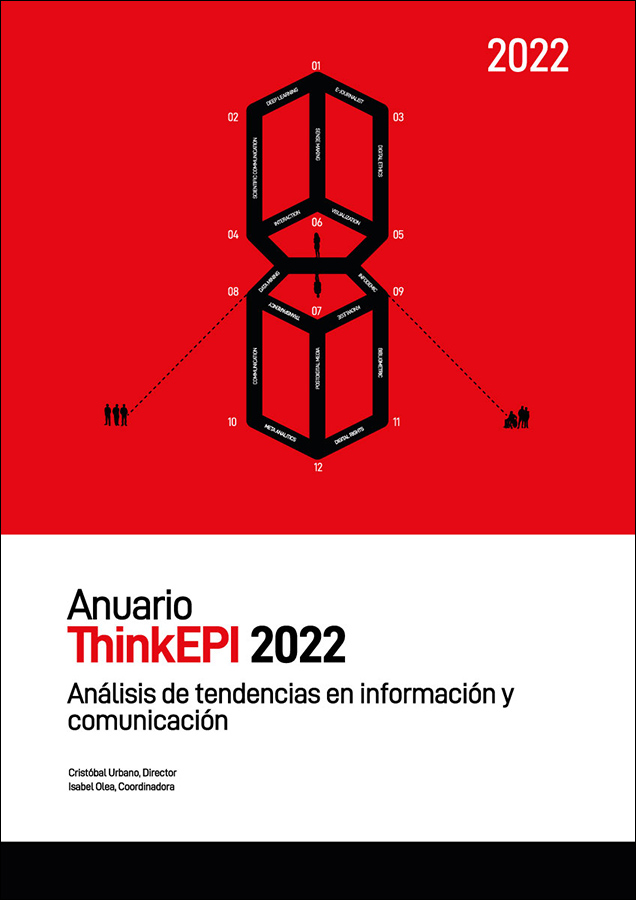Redefining meta-competencies, competencies, and skills of digital journalists
DOI:
https://doi.org/10.3145/thinkepi.2022.e16a03Keywords:
Digital journalism, Journalists, Training, Professional competencies, ProfilesAbstract
The digital transition has led journalism and journalists into the scenario that shapes today´s communication ecosystem and that demands new competencies and skills to exercise the profession. In three decades of changes, we have gone from the first digital migration, the emergence of digital-native media, the arrival of blogs, the rise of mobile communication, the emergence of social media networks, the rise of the social web, the application of virtual reality to certain pieces, the emergence of artificial intelligence, etc. to the rise of 5G and blockchain technologies. This transition has meant leaving behind a one-to-many communication model to bring many-to-many communication to the forefront, placing us in a liquid and platformized society. Communication is in the environment, being ubiquitous, while disinformation accompanies us in every movement and the challenges of building better-informed societies are multiplying. Journalists need up-to-date competencies and skills if they want to inform about what is happening in this complex networked society. Curricula are trying to respond to this challenge, while reflections on the best formulas combining sociocultural and sociotechnological competencies and skills are multiplying. After this phase of experimentation, this challenge calls for a renewal of proposals for the second half of the third decade of the millennium.
Downloads
References
Aguado, Juan-Miguel (2020). Mediaciones ubicuas. Ecosistema móvil, gestión de identidad y nuevo espacio público. Barcelona: Gedisa. ISBN: 978 84 18193 58 3
Aneca (2001). Libro blanco. Títulos de grado en Comunicación. Madrid: Aneca. http://www.aneca.es/var/media/150336/libroblanco_comunicacion_def.pdf
Basoredo, Carmelo (2011). "Una perspectiva y un modo de explicar la competencia desde el ámbito del desempeño de tareas". Anales de psicología, v. 27, n. 2, pp. 457-472. https://revistas.um.es/analesps/article/view/123091
Bauman, Zygmunt (2000). Liquid modernity. Cambridge: Polity Press. ISBN: 0 7456 2409 X
Bunk, Gerhard P. (1994). "La transmisión de las competencias en la formación y perfeccionamiento profesionales de la RFA". Revista europea de formación profesional, n. 1, pp. 8-14. https://dialnet.unirioja.es/servlet/articulo?codigo=131116
Briscoe, Jon P.; Hall, Douglas T. (1999). "Grooming and picking leaders using competency frameworks: do they work? An alternative approach and new guidelines for practice". Organizational dynamics, v. 28, n. 2. pp. 37-52. https://www.infona.pl/resource/bwmeta1.element.elsevier-9fbe6748-6c33-3014-8436-2f08bbb40aec
Deuze, Mark (2019). "What journalism is (not)". Social media + society, v. 5, n. 3. https://doi.org/10.1177/2056305119857202
Edosomwan, Simeon; Prakasan, Sitalaskshmi-Kalangot; Kouame, Doriane; Watson, Jonelle; Seymour, Tom (2011). "The history of social media and its impact on business". The journal of applied management and entrepreneurship, v. 16, n. 3, pp. 79-91. https://www.researchgate.net/publication/303216233_The_history_of_social_media_and_its_impact_on_business
Fernández-Salinero-Miguel, Carolina (2006). "Las competencias en el marco de la convergencia europea: Un nuevo concepto para el diseño de programas educativos". Encounters on education, v. 7, pp. 131-153. https://doi.org/10.24908/eoe-ese-rse.v7i0.603
García-Avilés, José-Alberto (2021). "Review article: Journalism innovation research, a diverse and flourishing field (2000-2020)". El profesional de la información, v. 30, n. 1, e300110. https://doi.org/10.3145/epi.2021.ene.10
Hallin, Daniel C.; Mellado, Claudia; Mancini, Paolo (2021). "The concept of hybridity in journalism studies". The international journal of press/politics, first online. https://doi.org/10.1177/19401612211039704
López-Martín, Álvaro; Córdoba-Cabús, Alba (2020). "Características y competencias de la enseñanza del periodismo digital en el grado de Periodismo en las universidades públicas españolas". Dixit, n. 33, pp. 61-73. https://doi.org/10.22235/d33.2377
Maares, Phoebe; Hanusch, Folker (2020). "Interpretations of the journalistic field: A systematic analysis of how journalism scholarship appropriates Bourdieusian thought". Journalism, first online. https://doi.org/10.1177/1464884920959552
Marta-Lazo, Carmen; Rodríguez-Rodríguez, Jorge-Miguel; Peñalva, Sheila (2020): "Competencias digitales en periodismo. Revisión sistemática de la literatura científica sobre nuevos perfiles profesionales del periodista". Revista latina de comunicación social, n. 75, pp. 53-68. https://doi.org/10.4185/RLCS-2020-1416
Masip, Pere; López-García, Xosé; Díaz-Noci, Javier; Palomo, Bella; Salaverría, Ramón; Meso-Ayerdi, Koldobika (2022). "Pasado, presente y futuro de la enseñanza universitaria del ciberperiodismo: métodos y tendencias". Profesional de la información, v. 31, n. 1. https://doi.org/10.3145/epi.2022.ene.01
Morgeson, Frederick P.; Delaney-Klinger, Kelly; Mayfield, Melinda S.; Ferrara, Philip; Campion, Michael A. (2004). "Self-presentation processes in job analysis: A field experiment investigating inflation in abilities, task and competencies". Journal of applied psychology, v. 89, n. 4, pp. 674-686. https://doi.org/10.1037/0021-9010.89.4.674
Orihuela, José-Luis (2006). La revolución de los blogs. Cuando las bitácoras se convirtieron en el medio de comunicación de la gente. Madrid: La Esfera de los Libros. ISBN: 84 9734 498 7
Palomo, Bella; Heravi, Behareh; Masip, Pere (2022). "Horizon 2030 in Journalism: A predictable future starring AI?". In: Vázquez-Herrero, Jorge; Silva-Rodríguez, Alba; Negreira-Rey, María-Cruz; Toural-Bran, Carlos; López-García, Xosé (eds.). Total journalism. Models, techniques and challenges. Switzerland AG: Springer Nature, pp. 271-285. ISBN: 978 3 030 88028 6
Reyes-de-Cózar, Salvador; Pérez-Escolar, Marta; Navazo-Ostua, Pablo (2022). "Digital competencies for new journalistic work in media outlets: A systematic review". Media and communication, v. 10, n. 1. https://doi.org/10.17645/mac.v10i1.4439
Salaverría, Ramón (2019). "Digital journalism: 25 years of research. Review article". El profesional de la información, v. 28, n. 1. https://doi.org/10.3145/epi.2019.ene.01
Sánchez-García, Pilar (2017). Periodistas (in)formados. Un siglo de enseñanza periodística en España: historia y tendenias. Madrid: Editorial Universitas. ISBN: 978 84 7991 478 3
Steensen, Steen; Westlund, Oscar (2020). What is digital journalism studies? London; New York: Routledge. ISBN: 978 0429259555
Van-der-Hofstadt-Román, Carlos J.; Gómez-Gras, José-María (coords.) (2006). Competencias y habilidades profesionales para universitarios. Madrid: Díaz de Santos. ISBN: 84 7978 796 1
Downloads
Published
How to Cite
Dimensions


